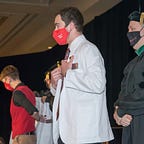A President’s Battle With Thomas Addison’s Disease
JFK’s Rare Condition
 John F. Kennedy is remembered for many things. Whether it is for his World War II heroics, time as a representative, senator, and president, or through his personal life, every American knows who JFK was, or at the very least knows of him.
John F. Kennedy is remembered for many things. Whether it is for his World War II heroics, time as a representative, senator, and president, or through his personal life, every American knows who JFK was, or at the very least knows of him.
One lesser known fact, however, is that Kennedy struggled with many chronic health conditions like severe back pain and digestive troubles for most of his life. He was also diagnosed with a rare disorder known as Addison’s Disease, or primary adrenal insufficiency.
Addison’s Disease
Addison’s Disease is an autoimmune condition where the body attacks its own adrenal glands. The two adrenals are small, triangular endocrine glands located just above both the right and left kidneys. When functioning normally, the glands produce a few key regulatory steroid hormones, the major players being a sodium regulating hormone (aldosterone), glucocorticoids, and weak androgens (sex hormones).
With Addison’s Disease, the glands do not produce enough of these crucial hormones. This leads to a variety of symptoms, such as low blood sugar, low blood pressure, nausea, vomiting, diarrhea, weakness, depression, anxiety, loss of body hair, and characteristic skin hyperpigmentation or darkening.
Kennedy, who was admired for his handsome nature and bronze skin, can thank his disease for the latter. Melanin producing cells, aptly termed melanocytes, are excessively stimulated in Addison’s Disease, which is why a skin darkening can be observed on the gums, lips, and sun-exposed skin in these patients.
To manage the disease, a patient is required to supplement their diet with the hormones they are missing. This means a lifelong dependency on corticosteroids like oral hydrocortisone and fludrocortisone.
JFK’s Diagnosis
Kennedy was reportedly first diagnosed with Addison’s in 1947 or 1948. Despite his lengthy history with medical conditions in his youth, it is been documented that this was the time that Kennedy first received a formal diagnosis encompassing his symptom profile.
When Kennedy was running for president in 1960, he and his campaign sought to downplay his diagnosis for a couple reasons. First, having a chronic disease could be viewed by some as a weakness, making someone unfit for the presidency. Obviously, this was not a valid concern as Jack was young and his disease was being managed. Second, there was a stigma surrounding Addison’s and its relatively uncommon association with tuberculosis. Kennedy’s opponents used this as fuel to dismiss him as a fit leader despite the fact that he was never diagnosed with tuberculosis.
During Kennedy’s time in office, there were a few notable examples of how the disease directly affected his actions. In October of 1962, he took increased steroid doses and salt tablets to combat his symptoms, an action geared towards improving his decision making during the height of the Cold War. A second came later that year in November. Kennedy was preparing to give a speech discussing the removal of weapons from Cuba, and so he elected to take an increased dose of steroids and salt tablets once again to control his disease manifestation.
Though Kennedy’s disease was being managed, he still had to deal with the ramifications of treatment. Since he was dependent upon steroid supplements to control the disease, Kennedy eventually developed severe osteoporosis, even of the spine. Taking longterm steroids can lead to decreased calcium and therefore increased bone breakdown in attempt to regulate calcium levels. Reportedly, he suffered through three fractured lumbar vertebrae as a result of his bone weakening, which is highly unusual barring any severe trauma.
Closing Thoughts
Given my status as a 3rd-year medical student, I had to elect for a mix of two of my favorite subjects, medicine and history. Though I had heard that Kennedy may have had Addison’s, I was never certain.
Following his autopsy, doctors did indeed conclude that the 35th President had primary adrenal insufficiency. His adrenal glands were noted to be nearly non-existent by the time of his death, exemplifying the dire need for the steroid regimen he followed strictly.
Though his image of a fit, healthy man was intertwined with his political aura, Kennedy actually struggled with his health for much of his life. However, despite the setbacks, he persevered and carved out a legacy that is both unique and timeless.
Sources
“All the President’s Secrets: John F. Kennedy and Addison’s Disease.” Healio, 12 July, 2019.
Brown, David. “JFK’s Addison’s Disease.” The Washington Post, WP Company, 6 Oct. 1992.
Dallek, Robert. “The Medical Ordeals of JFK.” The Atlantic, Atlantic Media Company, 1 July 2021.
Markel, Dr. Howard. “John F. Kennedy Kept These Medical Struggles Private.” PBS, Public Broadcasting Service, 22 Nov. 2019.
